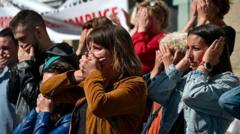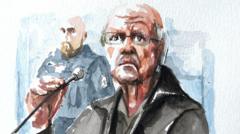**Amidst revelations of systemic failures, victims seek acknowledgment and change from society on child abuse issues**
**Silent Outcry: France's Inattention to Child Abuse Case Sparks Outrage**

**Silent Outcry: France's Inattention to Child Abuse Case Sparks Outrage**
**Victims of notorious paedophile surgeon demand recognition and action in landmark trial**
In the southern French town of Vannes, the trial of Joel Le Scouarnec—accused of abusing 299 children—should have been a turning point for societal awareness. Instead, amid a cloud of frustration and indifference, survivors are fighting against a collective silence that leaves them feeling invisible. While comparisons have been drawn to other high-profile abuse cases, the lack of public engagement has left victims voicing their despair and demanding action.
This trial was designed as a platform for transformation in France, yet it has revealed the disturbing reality that many are unwilling to confront. Victim Manon Lemoine expressed her anger over society's apathetic response, stating, “It's frightening to think [the rapes] could happen again.” With a special venue prepared and an overflow amphitheatre set up for what was anticipated to be a significant moment, the failures of the French system to fully address child sexual abuse loomed large.
Lemoine and over 50 other victims, feeling sidelined, have rallied to form a campaign group, urging the government to take serious action in recognizing the importance of this trial as a microcosm of institutional failings. Unlike other notorious cases bringing forth public figures to rally around, the absence of a single, identifiable victim – unlike Gisèle Pelicot in the Pelicot case – has contributed to the ongoing apathy.
The courtroom has laid bare the horror of Le Scouarnec's actions, detailing how he meticulously documented his crimes while in trusted medical positions. Meanwhile, the systems designed to protect and serve vulnerable populations show glaring weaknesses, with medical officials discussing their failures with a sense of shame.
With many victims grappling with memories and trauma, some have courageously chosen to publicly disclose their identities in hopes of changing societal attitudes towards abuse. Not only do the survivors desire recognition; they also seek to transform the conversation around trauma in the broader public sphere.
Despite heart-wrenching narratives, the trial rouses less public interest than anticipated, prompting questions about France's cultural silence surrounding child abuse. Advocates worry that unless formidable changes are carried out, efforts by victims to create awareness will go unheard, effectively rendering the Le Scouarnec trial a historical footnote rather than a catalyst for change. As the case nears its conclusion, the fate of the victims remains uncertain, but their voices are increasingly difficult to ignore.
The moment is poised at an essential juncture. Advocacy continues for broader societal acknowledgement and healing transformation, but with entrenched systems in place, the real question remains: How will France respond to the anguished cries of survivors demanding justice and recognition of their suffering?
This trial was designed as a platform for transformation in France, yet it has revealed the disturbing reality that many are unwilling to confront. Victim Manon Lemoine expressed her anger over society's apathetic response, stating, “It's frightening to think [the rapes] could happen again.” With a special venue prepared and an overflow amphitheatre set up for what was anticipated to be a significant moment, the failures of the French system to fully address child sexual abuse loomed large.
Lemoine and over 50 other victims, feeling sidelined, have rallied to form a campaign group, urging the government to take serious action in recognizing the importance of this trial as a microcosm of institutional failings. Unlike other notorious cases bringing forth public figures to rally around, the absence of a single, identifiable victim – unlike Gisèle Pelicot in the Pelicot case – has contributed to the ongoing apathy.
The courtroom has laid bare the horror of Le Scouarnec's actions, detailing how he meticulously documented his crimes while in trusted medical positions. Meanwhile, the systems designed to protect and serve vulnerable populations show glaring weaknesses, with medical officials discussing their failures with a sense of shame.
With many victims grappling with memories and trauma, some have courageously chosen to publicly disclose their identities in hopes of changing societal attitudes towards abuse. Not only do the survivors desire recognition; they also seek to transform the conversation around trauma in the broader public sphere.
Despite heart-wrenching narratives, the trial rouses less public interest than anticipated, prompting questions about France's cultural silence surrounding child abuse. Advocates worry that unless formidable changes are carried out, efforts by victims to create awareness will go unheard, effectively rendering the Le Scouarnec trial a historical footnote rather than a catalyst for change. As the case nears its conclusion, the fate of the victims remains uncertain, but their voices are increasingly difficult to ignore.
The moment is poised at an essential juncture. Advocacy continues for broader societal acknowledgement and healing transformation, but with entrenched systems in place, the real question remains: How will France respond to the anguished cries of survivors demanding justice and recognition of their suffering?




















